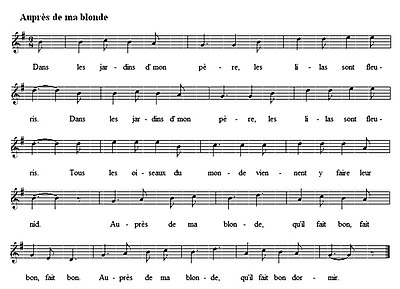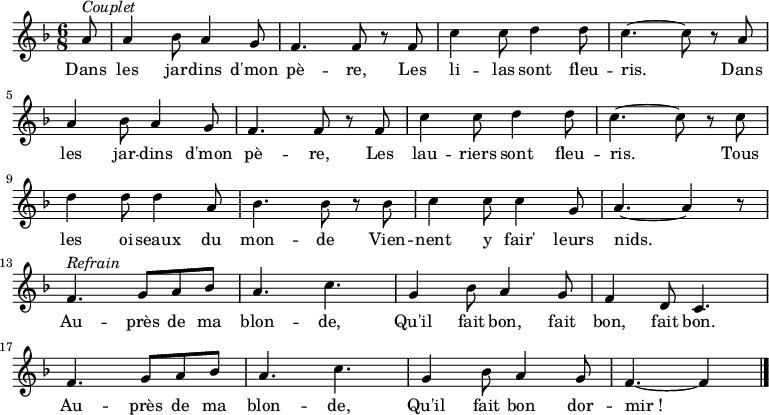Auprès de ma blonde: Difference between revisions
files |
SimLibrarian (talk | contribs) mNo edit summary Tags: Mobile edit Mobile app edit iOS app edit |
||
| (7 intermediate revisions by 7 users not shown) | |||
| Line 1: | Line 1: | ||
{{Short description|17th century chanson}} |
|||
{{ |
{{More citations needed|date=October 2020}} |
||
{{Expand French|Auprès de ma blonde|date=June 2020}} |
{{Expand French|Auprès de ma blonde|date=June 2020}} |
||
[[File:Auprès de ma blonde.jpg|thumb|upright=1.8|''Auprès de ma blonde''<br>[[File:Auprès de ma blonde (4 part).mid|frameless]]]] |
[[File:Auprès de ma blonde.jpg|thumb|upright=1.8|''Auprès de ma blonde''<br>[[File:Auprès de ma blonde (4 part).mid|frameless]]]] |
||
"'''Auprès de ma blonde'''" (French for "Next to My |
"'''Auprès de ma blonde'''" (French for "Next to My Girl") or "'''Le Prisonnier de Hollande'''" ("The Prisoner of [[Holland]]") is a popular [[chanson]] dating to the 17th century. The song tells the story of a woman who laments to the birds in her father's garden that her husband is a prisoner in Holland. It appeared during or soon after the [[Franco-Dutch War]] (1672–78), during the reign of [[Louis XIV of France|Louis XIV]], when French sailors and soldiers were commonly imprisoned in the Netherlands. |
||
The song's quick pace and lively melody made it well-suited to military marches, and it is still commonly played at parades. For the same reasons, it gained widespread popularity as a [[drinking song]] and [[nursery rhyme]]. |
The song's quick pace and lively melody made it well-suited to military marches, and it is still commonly played at parades. For the same reasons, it gained widespread popularity as a [[drinking song]] and [[nursery rhyme]]. |
||
==History== |
==History== |
||
The song was composed in 1704 during the reign of [[Louis XIV]]. A local tradition attributes the composition to André Joubert du Collet.<ref>{{cite book |first=Marc |last=Robine |title=Anthologie de la chanson française | |
The song was composed in 1704 during the reign of [[Louis XIV]]. A local tradition attributes the composition to André Joubert du Collet.<ref>{{cite book |first=Marc |last=Robine |title=Anthologie de la chanson française |language=fr |publisher=[[Éditions Albin Michel]] |year=2000 |isbn=2226074791 |page=291}}</ref> |
||
== Music == |
== Music == |
||
<score |
<score> |
||
\new Staff { |
\new Staff { |
||
\relative c'' { |
\relative c'' { |
||
| Line 62: | Line 63: | ||
} |
} |
||
} |
} |
||
</score> |
</score> |
||
==See also== |
==See also== |
||
*[[Compagnies Franches de la Marine]] |
*[[Compagnies Franches de la Marine]] |
||
*[[Corps of Royal Canadian Electrical and Mechanical Engineers]] |
|||
==References== |
==References== |
||
{{ |
{{Reflist}} |
||
{{Authority control}} |
|||
{{DEFAULTSORT:Aupres De Ma Blonde}} |
{{DEFAULTSORT:Aupres De Ma Blonde}} |
||
[[Category:French songs]] |
[[Category:French songs]] |
||
[[Category:French folk songs]] |
[[Category:French folk songs]] |
||
[[Category: |
[[Category:18th-century songs]] |
||
[[Category:Songs about the Netherlands]] |
|||
Latest revision as of 06:57, 6 June 2023
This article needs additional citations for verification. (October 2020) |
You can help expand this article with text translated from the corresponding article in French. (June 2020) Click [show] for important translation instructions.
|

"Auprès de ma blonde" (French for "Next to My Girl") or "Le Prisonnier de Hollande" ("The Prisoner of Holland") is a popular chanson dating to the 17th century. The song tells the story of a woman who laments to the birds in her father's garden that her husband is a prisoner in Holland. It appeared during or soon after the Franco-Dutch War (1672–78), during the reign of Louis XIV, when French sailors and soldiers were commonly imprisoned in the Netherlands.
The song's quick pace and lively melody made it well-suited to military marches, and it is still commonly played at parades. For the same reasons, it gained widespread popularity as a drinking song and nursery rhyme.
History
[edit]The song was composed in 1704 during the reign of Louis XIV. A local tradition attributes the composition to André Joubert du Collet.[1]
Music
[edit]
See also
[edit]References
[edit]- ^ Robine, Marc (2000). Anthologie de la chanson française (in French). Éditions Albin Michel. p. 291. ISBN 2226074791.
